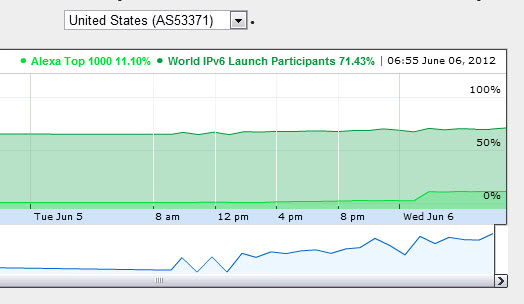Today IPv6 Launches, What you need to know

Whenever a device or user connects to the Internet, an IP addresses is assigned to the device. This may be a temporary IP address that may get changed with every connection, or a static IP address that never changes. The Internet has now come into a situation where there are more requests for IP addresses than available addresses. This leads to a situation where growth on the Internet is slowed down because of that fact.
The current IPv4 address space is good for 4.3 billion IP addresses, a large number but not nearly large enough. Consider this: there are more smartphones alone available in the world than IP addresses available. And smartphones are not the only devices that people make use of to connect to the Internet. They have desktop PCs, laptops, printers, gaming systems and maybe even refrigerators that can also connect to the Internet. Plus, there is the business side of things, with servers and networks that also need IP addresses.
Basically, the world has run out of IP addresses, and that's why the new standard IPv6 is being launched today. Being launched does not mean that it will be switched on, and the other will be switched off. Internet Service Providers, websites and network hardware manufacturers are merely enabling IPv6 for their products permanently on that day.It will run in parallel with IPv4 for some time.
For the majority of Internet users, nothing changes at all today. You will still be able to connect to the Internet as usual, and access websites and services like before. Depending on the devices and operating systems used, some users may even need to upgrade their hardware or software in the future before they become IPv6 compatible. For now though, thanks to IPv4 and IPv6 running in parallel, Internet connectivity should not be any different from yesterday, or a year ago.
If you are interested in your system's IPv6 compatibility, you can run this little test in a web browser of your choice to find out more about it.
The transition from IPv4 to an exclusive use of IPv6 will take years. Some experts estimate the transition time to be ten years or more before IPv4 will be retired for good. The best way to find out more about how IPv6 will affect you is to contact your Internet Service Provider.
Advertisement


















I have IPV6 disabled. I use openvpn and I was getting DNS leakage even with all my static IP addresses enabled (IPV4 and IPV6). Until this issue is resolved I’m sticking with IPV4 only.
I’ve disabled ipv6 on all of my devices too. It won’t be needed for decades if not longer IMO especially here in the US.
I read an article a couple years back labeling ipv6 one of the most overrated techs in history thanks to NAT.
I’m aware this is a blog and not a forum, still I’d appreciate a word on the following topic :
Microsoft TCP/IP version 6
I’m running XP SP3 and there is a connection protocol available called ‘Microsoft TCP/IP version 6’. Is this related to our concern of IPv6, should I install it ?
No connection problem. Just wondering if I should install this protocol or not.
Thanks
I do not think it is necessary to install the protocol right now, as most services and websites will support both protocols for the foreseeable time.
OK. Thanks Martin. Persons as myself who ignore the basics of Internet connection protocols are destabilized by major changes likes IPv4 -> IPv6.
Anyway, as long as the connection is on, all answers are as well. Problem is when no connection !
Thanks.
Your ISP will probably inform you once the change becomes necessary.
This morning I also read an article about this IPv6 launch on a Dutch site. Apparently there are only 66 ISPs world wide offering IPv6.
I understood that also your modem/router should be technically ready for this new IPv6. So yeah for sure, it will take some years before I will notice the difference.